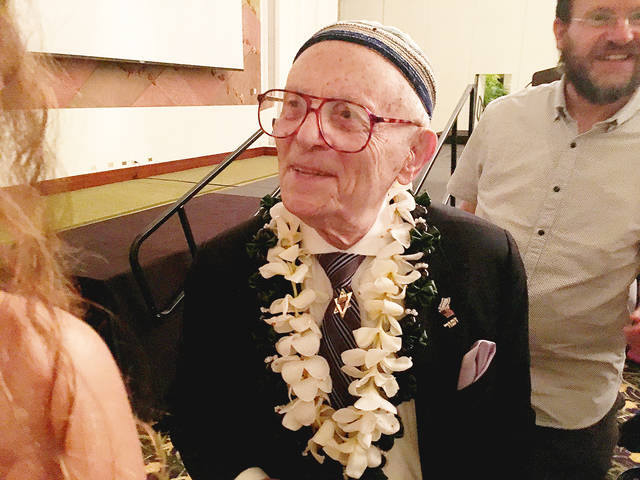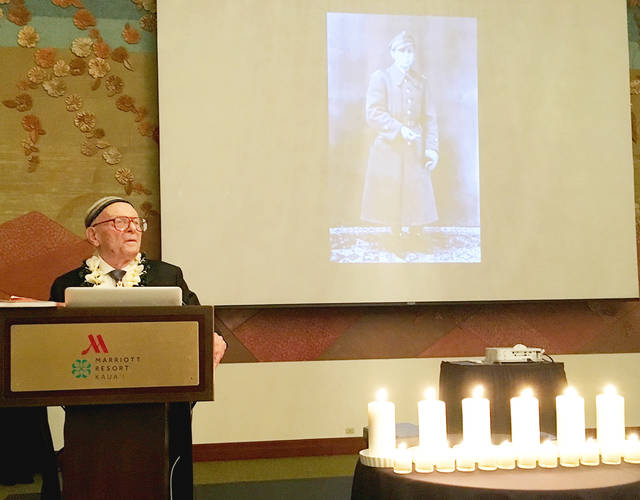LIHUE — One by one, six candles began to glow Sunday night for the estimated six million Jewish people who died at the hands of Nazi Germany in World War II.
Then, smaller candles flickered for the 11 people who were shot and killed Saturday morning in an attack on a Pittsburgh synagogue.
“It shook us that in free America, people praying in a place of worship should be gunned down, just because of their identity, and in this particular case, because they were Jewish,” said Rabbi Michoel Goldman in the ballroom of the Kauai Marriott Resort and Beach Club.
He looked out at the 200 people who had come to hear from Holocaust survivor Dr. Jacob Eisenbach and said what happened nearly 80 years ago is more than a memory. Bigotry, intolerance and hatred still have strongholds around the world and their repercussions remain.
“Unfortunately, antisemitism is alive and well,” he said.
Few would know that better than 95-year-old Eisenbach. In a one-hour program marked by audience silence and sobs, the soft-spoken man outlined what happened to him and his family living in Lodz, Poland after Germany invaded the country on Sept. 1, 1939.
“A wonderful childhood was transformed into an unimaginable nightmare,” he said.
Black and white pictures of his brothers, his sister, his parents, flashed on the wall.
He was there to talk about “a problem of global importance, which is genocide.” It’s been happening for thousands of years, Eisenbach said, not only against Jews, but all kinds of races, nationalities and religions.
“And it’s time for mankind to do something about it,” said the retired dentist from Southern California.
Since he retired three years ago, his mission has been singular.
“As an eyewitness to the greatest crime against humanity in human history, I feel a moral obligation to speak about it, to keep telling people what actually happened, which should never be forgotten,” he said.
What happened to his family? A brother, a sister, his father, died in the Holocaust. Another brother, a commander in the Polish Army, was killed in a hate crime, two years after the war ended, because he was Jewish. Of 100 extended family members, Eisenbach said only he and a cousin remain. His mother died at age 41 of illness before the war.
Within a week of Germany invading Poland, Eisenbach said a barbed wire fence went up in Lodz to create a prison camp patrolled by Nazi guards with machine guns and searchlights. Anyone outside that fence could be shot. Prisoners were put on what he called a starvation diet. There was no help.
“We were completely cut off from the rest of the world,” Eisenbach said.
Some days, Jewish people, children to seniors, were packed tight into cattle trucks and hauled away, told they were being taken to a labor camp. They would never return.
“But that was a lie,” Eisenbach said.
Many were bound for Auschwitz, where they were killed in gas chambers.
Eisenbach recounted how he tried to save his brother, Henry, who was in the hospital, and ran to get him out. It was too late. Nazi soldiers were pushing patients into a truck. Eisenbach jumped up on the truck to look through an opening for Henry, when a soldier fired at him.
“I ran into the building,” he said. “His bullets did not catch me.”
He would never see Henry again.
Eisenbach and his brother Sam were later caught hiding in a pile of straw in a house, and sent to work in a munition factory, where conditions were brutal. He told of watching a good friend fall, his leg injured, and a Nazi guard walked up and shot him in the head.
But the Eisenbach brothers survived.
“I met my future wife in the most romantic place you can imagine, a Nazi concentration camp,” he said with a smile as the crowd laughed.
Eisenbach said he never lost faith in humanity or God. Jewish people, he said, have had many persecutors throughout history. They are all gone, but the Jews are still here, he said.
Someone asked him, “What is the secret?”
“There is no secret,” Eisenbach said. “The reason we are still here is because of our indestructible faith in God.”
Has revenge crossed his mind?
No. Hope and love are much better paths, he said.
“Our Jewish tradition teaches us, the greatest achievement is to turn an enemy into a friend. That is much better than continuing fighting back and forth,” he said.
Eisenbach said the shooting in Pittsburgh was a crime against humanity “committed as a result of hatred.” He urged the crowd to recognize “what crime can do, what hatred can do.”
“The Holocaust is a direct consequence of hatred, discrimination and intolerance.”
Goldman said there was a 57 percent increase in incidents of antisemitism in America, to 1,900 in 2017 from 1,200 in 2016.
The Pittsburgh shooting was a wake up call that it’s up to everyone to combat all forms of bigotry and to stand up against hate, Goldman said. At the same time, he called for tolerance on all sides and having conversations with those of other views, not heated arguments.
But the one thing people can’t do is remain silent and afraid, Goldman said. Then, the enemy wins.
“All of humanity, be vocal against intolerance,” he aid.
Eisenbach, who received a standing ovation, said there are some who deny the Holocaust happened. He shook his head.
“That makes it so much more important for me to do what I’m doing,” he said.
Eisenbach speaks to high school students and tells them to guard their minds against hatred. It’s a lesson they must learn young. He recalled when his mother would put her arms around all four of her children and tell them, “you are my greatest possession.”
“She never knew what that would do for us,” he said. “No matter what Hitler said or did to us, he couldn’t have possibly destroyed the feelings that our parents built into us, that we are loved and our lives are important.”
There are weapons that can be used against genocide, Eisenbach said — treat your neighbor as you would treat yourself, and help those in need.
“Someday, genocide can be eliminated and people can say with confidence, never again,” he said.
He said one lesson from the Holocaust stayed with him throughout his life.
“That is, no matter how dark the clouds may be, there will always be a day when the sun will break through,” he said. “Never lose hope for a better day no matter how bad the situation you are in. And I was at the bottom of the pit.”
“But I always remembered the blessings of my parents, never to lose hope for a better day. And it helped me to survive.”



